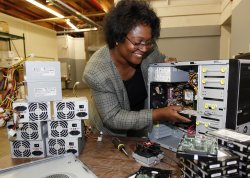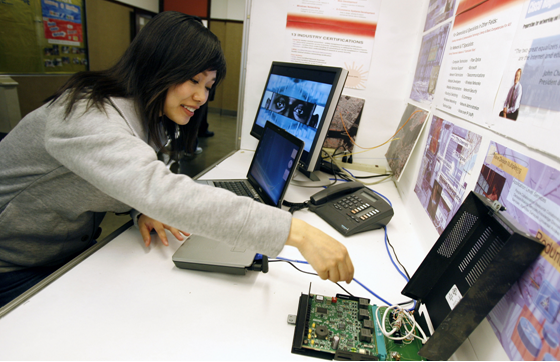Women's Success Stories

|
VALERIE STEWART “What I would say is this: especially if you are married and have kids, don’t stop, be persistent, continue even if it’s just one class each semester or each year. It all adds up. Be persistent and stick with it.” |
Career Quick Look
| Salary: | $50K - $65K | Education: |
| Years in Field: | 28 years | Multiple courses, CCSF and Merritt College (programming, hardware, data communication, networking, etc.) MCSE, A+ and CCNA certifications |
| City/State: | Pittsburg, CA |
Getting Started: Valerie Stewart realized during high school that she wanted to work with
computers – even though personal computers had not yet been developed at the time. Her first
job in 1979 was working for PG&E as a clerk when she left college after one year. “I figured out
this wasn’t where I wanted to be, and I had to pay off my student loans so this was the first job
that I had,” says Valerie. While working midnight shift as a clerk, she noticed there was a slot
open for a computer tech and she transferred into the mainframe section. She liked that the pay
was the same for men and women in the computer field, and also appreciated that there was no
smoking allowed, which was unusual at the time. She was later promoted to a program analyst
position.
She did similar work for UC Berkeley and a community college during the 90’s, and later worked at Marin General Hospital doing mainframe and PC support. “Basically, I was the evening shift, and anything computer related in the whole hospital I had to do. From 4 p.m. to midnight, I was the one they called. It was a really interesting job.” Valerie left that job when she was not able to get a promotion she wanted, and found her current position with Contra Costa County in 2001.
In her role as a desktop computer technician there, she helps county employees in the employment and human services department keep their PCs in top shape. Many of her users have specialized applications on their computers, and she makes sure all the PCs are in perfect running condition so they have the tools they need to do their jobs. She covers the county locations between Richmond and Brentwood.
Education: Valerie attended one year at the University of California at Berkeley when she was 17, but she wasn’t prepared for the competition and the huge campus of 30,000 students. When she went to work at PG&E, she took classes every semester or two, hoping to complete her degree at some point. “That’s where I’ve gotten most of my knowledge, by going to community colleges and taking computer courses.” She took programming, hardware, data communication, and networking courses to build her knowledge base. Because she was raising her daughter and working full time over much of her career, Valerie also taught herself a great deal at home by studying books and building computers from scratch from old PC parts. This helped broaden what she was learning in her coursework.
Through a program sponsored by the Private Industry Council, Valerie obtained her Microsoft Certified Systems Engineer (MCSE) certification, which made her more competitive when she applied for her current position. She eventually also obtained A+ certification and Cisco Certified Network Associate (CCNA) certification. Because she didn’t have a job in networking field at the time, she let this certification lapse. CISCO has rewritten their curriculum, so she is studying for the CCNA certification again now at the Community College of San Francisco (CCSF).
She chose CCSF because the classes were more convenient. “I live close to the BART line in Pittsburg and CCSF is 3 blocks away from the Balboa station,” Valerie says. She also reports that they have a great selection of classes to choose from. “CCSF takes itself seriously about technology, and they have the classes to back it up!” By the end of summer 2008 she hopes to take the CCNA certification exam again. “You can’t stop taking courses. Technology changes every 18 months or so, everything is new again,” she says. “I’m one of the lucky few – there are not very many of us women who get into the computer field without a degree, and manage to make a decent living at it and be content with the salary. It’s not that way now, but before it was. If you knew what you were doing you had a job, period. I guess I just took advantage of that.”
Now that her daughter is in her second year of college, Valerie is giving serious thought to getting her degree. “What I like about taking computer classes at CCSF is the enthusiasm of the instructors – how much they actually like what they are doing and their willingness to share their knowledge with those who are not as knowledgeable. I have fun doing the labs now; before I was always getting so lost. Here at CCSF the instructors are so helpful. I get lost, but they do not mind taking the time to get me back on track and explain exactly what is happening. Even for a second time, or more,” she says. Valerie is fascinated by the evolution of telecommunications, broadband, and wireless services, and would like to move into that part of the field next. “I’m only five classes short of my A.A. degree and then I want to go to Cal State.”
Greatest Professional Achievement: Valerie considers her move into management at PG&E as her biggest accomplishment. After starting out as a clerk working the evening shift, she transferred into a role as a computer operator working on the mainframe, her first job in the computer field. Later, when the company was reorganizing, they were experimenting with taking employees from one area and giving them training in another area. They tested the people who wanted to go, and of the 40 they tested, Valerie was one of just three who were selected. “That happened overnight. Friday I was a computer operator, and Monday morning I was a program analyst.” She received training in computer programming along with a sizable pay raise. “There were so many who didn’t think we could do it,” she said of her success in this role. Valerie found that she did not enjoy programming, so when she left PG&E three years later she decided to concentrate on the technical side.
Barriers: “When I was working for Marin General I didn’t notice any barriers until I wanted to be promoted into that analyst position,” says Valerie. “The thing that really peeved me was that I was more technical and had more experience than the person who had just left the job. That was right after I got my MCSE and A+ and was studying for my CCNA exam. I didn’t understand why she wouldn’t promote me at the time, so I guess I could conclude that was a barrier. There was something holding me back from getting that job.” Valerie decided to move on and found her current job at Contra Costa County.
She has not noticed barriers in her classes at CCSF. “They [the instructors] treat me like they really want me to be a part of their class. Their actions say that if there is anything they can do to help me become a successful student in their class they will do it.”
Working with Men: “Right now I’m the only female tech out of 13 other technicians,” says Valerie. Most of her co-workers are about ten years younger than she is. She has noticed a lot of conflict between the guys, so she tries to stay away from the office and out of the fray. This allows her to connect with anybody in the office without any kind of background agenda going on. “Keep them at a distance,” she advises. “I tend to be OK with basically everybody, in fact in the eight years that I’ve been there, I have not had a conflict with anybody.”
Advice for Women: “Be persistent,” Valerie advises women entering this field. “If some guy tells you that you can’t do it, ignore him and go find another way. If you are shy, retiring, you won’t get anywhere.” Valerie has experienced being almost the only female in a CISCO class of 30. “Sometimes you have to elbow these guys out of the way, you’ve just got to push back, and give them that dirty look if they need it.” She finds that the older guys tend to be nice. “It’s the younger ones whose toes you have to step on.”
Now Valerie sees more women in the classes and more women who are interested in network technology. “Any question I may have is taken seriously and I feel like a valid student, no different from anyone else,” she says. “What I would say, especially if you are married, with kids, is don’t stop, be persistent, continue even if it’s just one class each semester or each year. It all adds up. Be persistent and stick with it.” Valerie also wishes she had stayed in school and gotten a degree when she was younger. “Even though it was hard at the time and I didn’t know what I wanted to do, I should have stuck with it, even if it was a degree in art, just to have finished. That’s what I didn’t realize I should have done.”
Typical Workday/Environment: As a technician in the field, she starts her days at 7:00 a.m. and finishes at 6:00 p.m. Every day is different. Throughout the day as the help desk takes in calls for help, these are transferred to Valerie’s Blackberry, so she gets the word that someone needs attention. The problems could be as easy as changing out a keyboard mouse, or as complicated as working with a database or highly specialized applications such as PeopleSoft. At times, she interfaces with other departments and groups because this software package is used by multiple departments. If she finds a problem she cannot repair on site, she takes the computer back to the office to figure out what’s wrong with it or locate parts.
Every other week, Valerie spends a day working at the help desk herself, responding to employees who call in with computer problems. She helps them fix the problem over the phone if possible, or sends a dispatch team that goes to the employee’s desk. Working the help desk only twice a month keeps it from being tedious. Her customers are spread throughout her territory, so a lot of driving is involved as she travels between county offices. “It can be kind of intense and very busy at times,” she says. Most of the tools she uses are available online, but she carries tools in her vehicle for simple hardware repairs.
Valerie is able to dress casually, wearing comfortable shoes, jeans, and a t-shirt. “I do crawl under the desk, and sometimes they are extremely filthy so I wouldn’t want to be wearing really nice stuff. Sometimes I work around printers and get dumped with toner or ink. As long as there are no holes in what you’re wearing, it’s OK,” she says.
Career Ladder: Information Technicians within Contra Costa County may apply for Network Technician positions, which are at the same level but require a different skill set and make a good lateral move. Further advancement possibilities at the management level include the Network Administrator and Network Manager positions. Promotions can be difficult to come by internally, since outside candidates are often selected. A full benefit package comes with a full-time position, but medical, dental, and retirement benefits all require employee co-pays.
Professional Associations: Valerie belongs to the CISCO East Bay Users Group, which offers speakers, CISCO product presentations, and networking opportunities at its monthly meetings. She is also a member of Union Local 1 of the Service Employees International Union (SEIU).
Hobbies: Valerie brings her interest in computers home with her after work. “I’m one of those strange people, after spending 12 hours at work I actually come home to a PC and I’m on it for the evening. I do stuff like Live Journal, fiction stuff, I work on my wireless router, fixing PCs, I go to school, and that’s pretty much it. I do have a passion for it, if I didn’t I couldn’t do that.”
 Copyright 2010 National Institute for Women in Trades, Technology & Science | http://www.iwitts.com |


